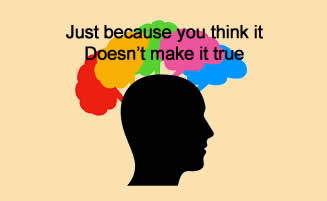 Thoughts, feelings, hunches and intuitions are assets at our disposal to help us make decisions. However, our judgements are often impaired, especially if we are experiencing stress or are in some form of conflict. So believing what we are thinking and basing our decisions and judgements on it can be quite hazardous. To further complicate matters, even if our thought process is logical it doesn’t necessarily mean our conclusions are accurate (possibly our assumptions are inaccurate or we have not considered all relevant factors).
Thoughts, feelings, hunches and intuitions are assets at our disposal to help us make decisions. However, our judgements are often impaired, especially if we are experiencing stress or are in some form of conflict. So believing what we are thinking and basing our decisions and judgements on it can be quite hazardous. To further complicate matters, even if our thought process is logical it doesn’t necessarily mean our conclusions are accurate (possibly our assumptions are inaccurate or we have not considered all relevant factors).
The meanderings of our minds often transform thoughts into unhelpful stories that are often an impediment to making the best of situations.
For example, Tammy angrily explained, “At the dinner party last week, Robert said that I used to get a lot of attention from other men. Robert knows that I am concerned about aging and if he really loved me he would not imply that I am losing my attractiveness.” Or Jimmy explained, “Denise mentioned a couple of weeks ago that Trevor had begun working at the office. She said he was good looking and very helpful. Over the last week, Denise had not picked up the phone when I have rung her at work. I think that something is going on with her and Trevor. I told my best mate Gary and he said that gut feelings are nearly always right.”
We humans have a tendency to remember when we get it right but our memories are not so reliable when we get it wrong (confirmation bias possibly). I encourage my clients to make peace with their ruminations and do so in a mindful way.
Patrick Moloney Aug 2020
